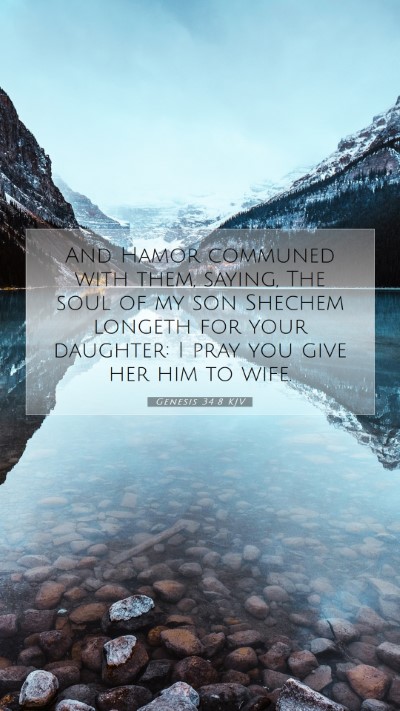Understanding Genesis 34:8
Introduction
Genesis 34:8 is a verse that presents a significant moment in the narrative of Jacob's family, particularly focusing on the character Shechem and the aftermath of his actions towards Dinah. This commentary will explore the Bible verse meanings, interpretations, and understanding through the insights derived from public domain commentaries, including those by Matthew Henry, Albert Barnes, and Adam Clarke.
Genesis 34:8
“But Hamor spoke with them, saying, 'The soul of my son Shechem longs for your daughter. Please give her to him as a wife.'”
Contextual Analysis
The events surrounding this verse occur after the incident where Shechem, the son of Hamor, rapes Dinah, Jacob's daughter. This act leads to a complex series of negotiations and repercussions for both families involved. To understand the implications of this verse fully, one must consider the cultural and historical context of the time, as well as the emotional turmoil faced by the characters.
Cultural Significance
-
Marriage Customs: In ancient Israelite society, marriages were often arranged, and the permission of families was essential. The request made by Hamor indicates his desire for reconciliation despite the grave offense committed by his son.
-
Honor and Shame: The incident places both Shechem and Dinah's families in a moral dilemma that involves public honor and familial reputation.
Commentary Insights
Matthew Henry's Commentary: Henry emphasizes the gravity of Shechem's actions and the emotional turmoil it brings to Jacob's family. He reflects on the notion of deep longing, suggesting that Shechem's desires represent a blend of lust and a desire for a legitimate relationship, complicating the restorative efforts after his wrongdoing.
Albert Barnes' Notes: Barnes suggests that Hamor’s words are an attempt to negotiate peace; he presents a desire for Shechem's love and appreciation for Dinah, further complicating how one might interpret Shechem's initial actions.
Adam Clarke's Commentary: Clarke elaborates on the moral implications of Hamor's request, questioning the sincerity of Shechem's desire and whether it stems from genuine affection or is merely a reaction to his previous actions.
Theological Reflections
This verse brings to light themes of reconciliation, justice, and the consequences of sin. It raises important questions regarding the nature of love and desire in human relationships and how such relationships are woven into the fabric of familial and societal obligations.
Potential Applications
-
Understanding Human Relationships: This verse can encourage readers to reflect on the complexities of relationships and the importance of consent, respect, and the need for reconciliation after conflicts.
-
Biblical Exegesis: The verse invites deeper exploration into how actions have consequences and God’s justice in response to human failings.
Cross-References
- Genesis 34:1-2 - The initial account of Dinah's encounter with Shechem.
- Deuteronomy 22:28-29 - The legal repercussions of a similar act in ancient Israel.
- Exodus 22:16-17 - Further stipulations regarding seduction and marriage in the law.
Conclusion
Genesis 34:8 provides an intricate look into the dynamics of a highly charged moment in biblical history. It captures the longing of Shechem for Dinah which, while possibly rooted in affection, raises critical questions about morality and the consequences of actions within a familial context. The insights drawn from noted commentaries augment our understanding of this complex scripture, enhancing both Bible verse explanations and providing essential human insights. For those in Bible study groups or seeking online Bible study resources, this verse offers a rich ground for learning and reflection.


